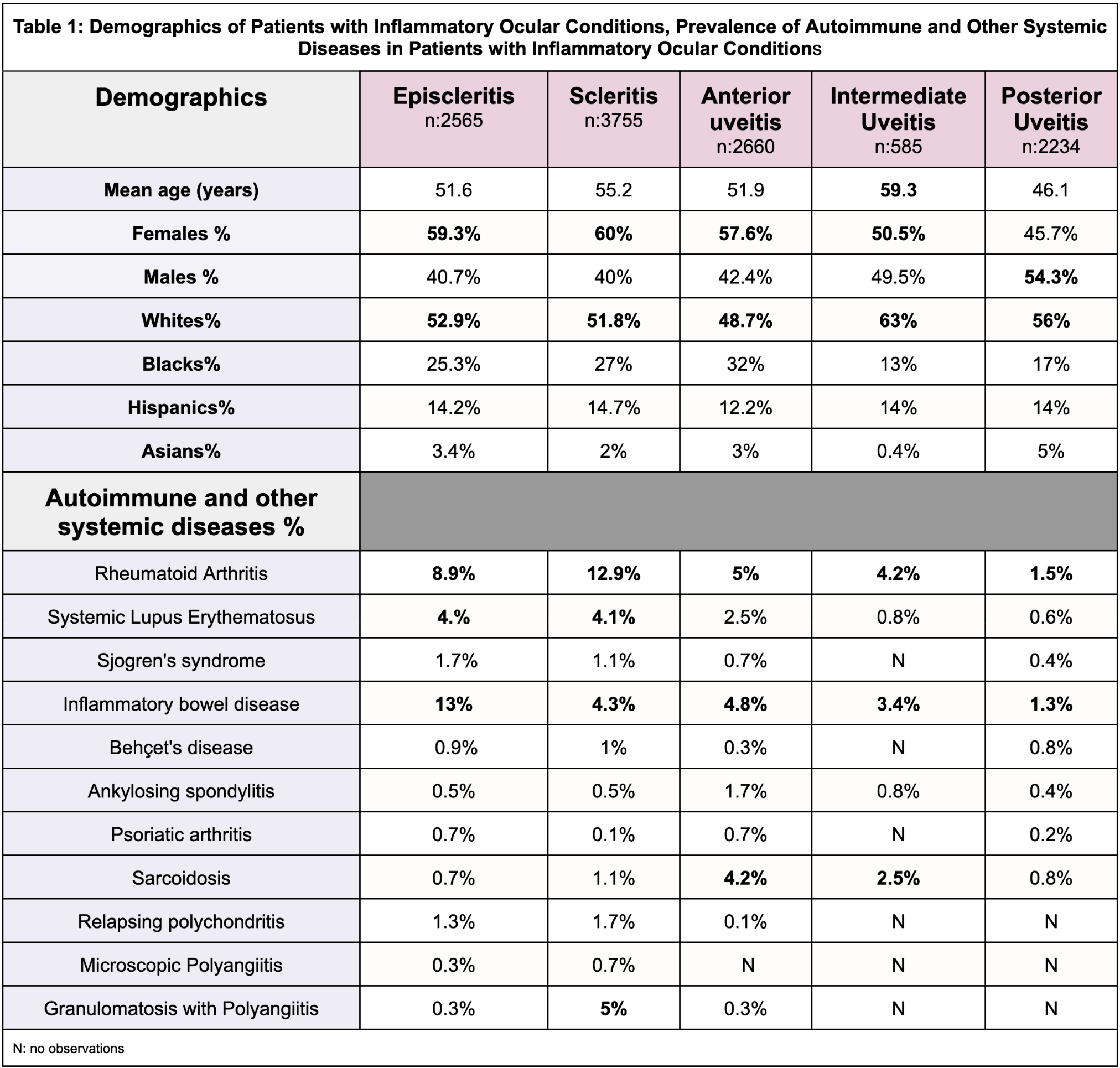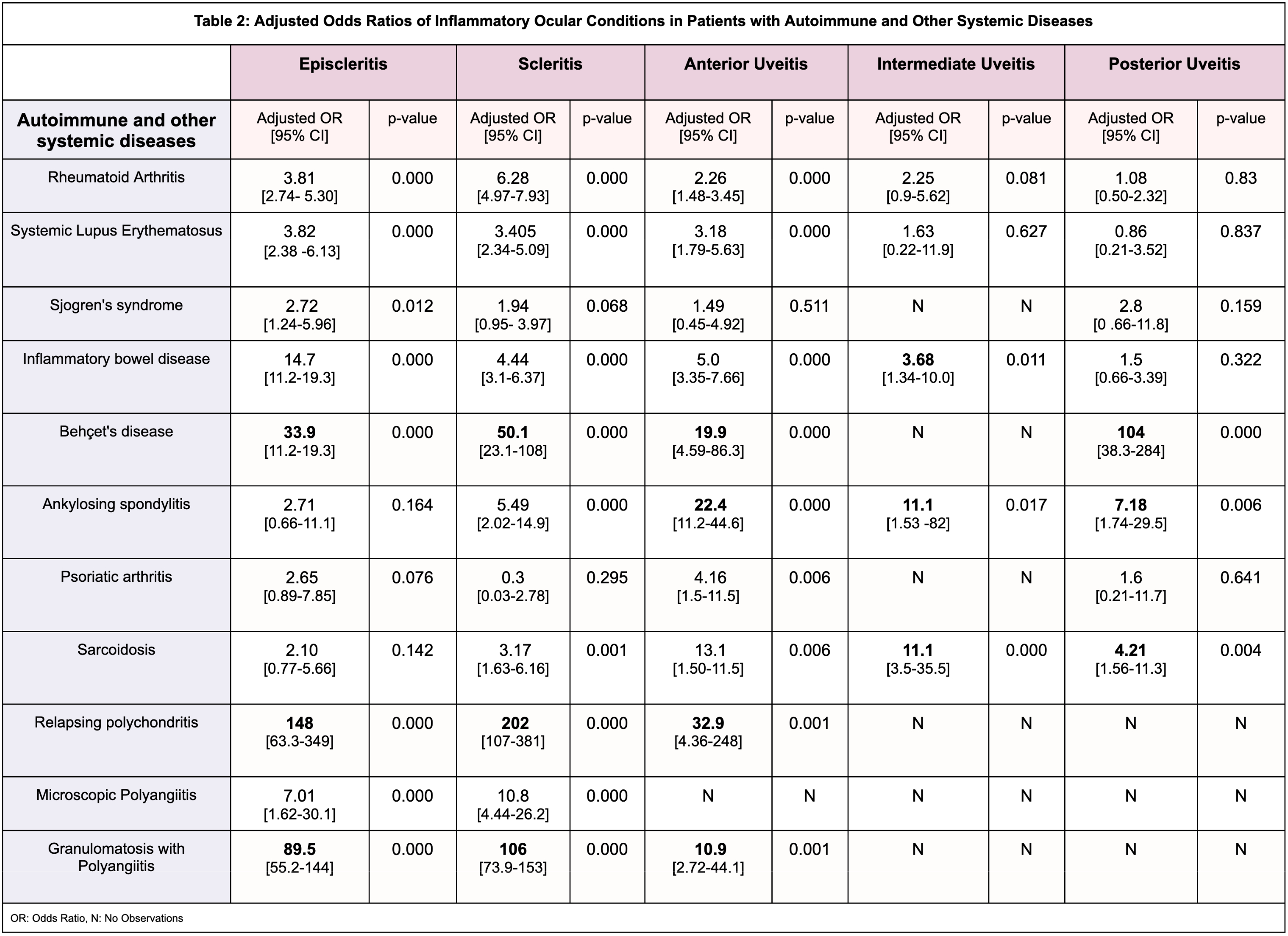Session Information
Session Type: Poster Session B
Session Time: 10:30AM-12:30PM
Background/Purpose: Autoimmune diseases are known to cause various ocular inflammatory conditions and are often the initial presentation in many of these diseases. This study aims to investigate the demographic characteristics of patients with ocular inflammatory conditions, the prevalence of autoimmune diseases in these patients, and the odds of having an ocular disease if diagnosed with an autoimmune disease, using data from the Nationwide Inpatient Sample (NIS) database.
Methods: Patients who were 18 or older, and were hospitalized between January 1, 2016, and December 31, 2019, with an ocular condition including Episcleritis Scleritis or Uveitis, were identified from the National Inpatient Sample (NIS) database using the International Classification of Diseases, Tenth Revision (ICD-10) codes. Demographic characteristics including mean age, sex distribution, and racial composition were examined for each ocular condition. Prevalence rates of autoimmune and systemic diseases, including rheumatoid arthritis (RA), systemic lupus erythematosus (SLE), and Sjogren’s syndrome, were calculated for each ocular condition. The adjusted odds ratios (ORs) were calculated using logistic multivariate regression analysis, controlling for age, race, sex, possible infections, and other comorbidities, to assess the associations between autoimmune diseases and ocular inflammatory conditions.
Results:
The mean age varied across different ocular conditions, with posterior uveitis patients being the youngest (mean age: 46.1 years) and intermediate uveitis patients being the oldest (mean age: 59.3 years). Females were predominant in all ocular conditions, ranging from 45.7% in posterior uveitis to 60% in scleritis. Whites constituted the majority racial group across all ocular conditions, while the prevalence of autoimmune and systemic diseases varied. RA and inflammatory bowel disease were commonly observed across all ocular conditions, with RA being observed in 12.9% and 8.9% of patients with scleritis and episcleritis respectively.
The adjusted odds ratios revealed significant associations between autoimmune diseases and inflammatory ocular conditions. Notably, Behçet’s disease exhibited significantly increased odds of episcleritis (OR 33.9, p < 0.001) and intermediate uveitis (OR 50, p < 0.001). Relapsing polychondritis showed a high odds ratio for scleritis (OR 202, p < 0.001). RA and SLE were associated with increased odds of developing scleritis (OR 6.2 and 3.4, respectively; both p < 0.001) and episcleritis (OR 3.8 for both, p < 0.001). Other notable findings include patients with granulomatosis with polyangiitis having higher odds of developing scleritis (OR 106.5, p < 0.001) and episcleritis (OR 89.5, p < 0.001), as well as a strong association for patients with sarcoidosis to develop anterior uveitis (OR 13.1, p =0.006)
Results are summarized in Tables 1 and 2
Conclusion: Our retrospective analysis reveals that patients with autoimmune diseases have a higher risk of developing inflammatory ocular conditions. This underscores the importance of regular eye examinations for individuals with autoimmune diseases to ensure early detection and management of potential ocular complications.
To cite this abstract in AMA style:
Rabah S, Kang X. Risk of Ocular Inflammatory Conditions in Patients with Autoimmune Diseases: A Retrospective Study Using the National Inpatient Sample [abstract]. Arthritis Rheumatol. 2024; 76 (suppl 9). https://acrabstracts.org/abstract/risk-of-ocular-inflammatory-conditions-in-patients-with-autoimmune-diseases-a-retrospective-study-using-the-national-inpatient-sample/. Accessed .« Back to ACR Convergence 2024
ACR Meeting Abstracts - https://acrabstracts.org/abstract/risk-of-ocular-inflammatory-conditions-in-patients-with-autoimmune-diseases-a-retrospective-study-using-the-national-inpatient-sample/


